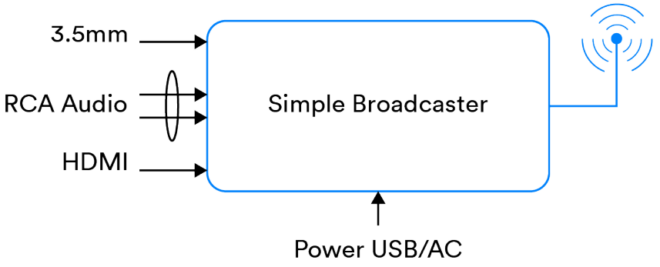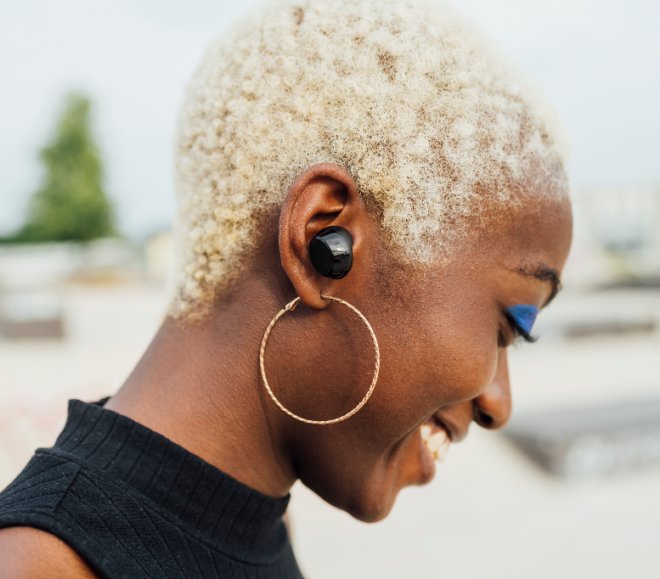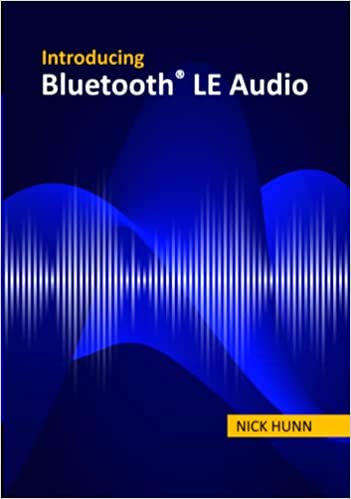Founded 13 years ago by a Chicago-based ENT, MDHearing strives to deliver high-quality, affordable hearing aids to consumers. Knowing how crucial high-quality hearing is, MDHearing is committed to providing clinic-level care, offering 24-7 support from a US-based team of trained and licensed hearing aid specialists and audiologists.
I recently had an opportunity to hear from Doug Breaker, CEO of MDHearing, and learn more about how they are using Bluetooth LE Audio to enhance hearing aids.
Q&A With Doug Breaker From MDHearing
What has been your involvement in the development of Bluetooth LE Audio?
MDHearing worked closely with the Bluetooth Special Interest Group (SIG) and Nordic Semiconductor to add Bluetooth LE Audio and Auracast™ broadcast audio in its Volt Max line of hearing aids. MDHearing took part in the Auracast demo in Tampa in June 2022 as part of the HLAA convention.
“Bluetooth LE Audio provides a much-improved way to implement Bluetooth® connectivity in hearing aids.”
What benefits do Bluetooth LE Audio hearing aids provide?
Bluetooth LE Audio provides a much-improved way to implement Bluetooth® connectivity in hearing aids. It reduces power consumption, which makes producing smaller, more discreet aids a possibility. Bluetooth LE Audio brings a much-simplified programming interface which lowers development and support time. Additionally, Bluetooth LE Audio introduces Auracast™ broadcast audio, a new broadcast capability for Bluetooth technology that can dramatically increase accessibility for hearing aid wearers.
How might Auracast™ broadcast audio impact those who wear hearing aids?
Auracast broadcast audio promises to change the game for hearing aid wearers by making it very cost effective and easy for locations to provide Auracast™ audio broadcasts. Setting up an Auracast™ transmitter will be very economical and is as easy as plugging in a small broadcaster into an existing audio source, whether that’s a TV, microphone system, or any other audio source. Hearing aids that have implemented Auracast™ broadcast audio will be able to easily join those broadcasts to directly stream the audio into the hearing aids. This decrease in cost and simplicity of use should usher in a wave of increased accessibility.
“Auracast™ broadcast audio promises to change the game for hearing aid wearers by making it very cost effective and easy for locations to provide Auracast™ audio broadcasts.”

FEATURED INNOVATION
Auracast™ Broadcast Audio
Auracast™ broadcast audio will deliver life-changing audio experiences that will enhance the way you engage with others and the world around you.
Can you explain the difference between Auracast™ broadcast audio and existing assistive listening technologies (e.g., telecoil/loop, etc.)?
Auracast™ broadcast audio brings a host of new benefits versus the telecoil + loop systems that exist today. At MDHearing, we do not see Auracast broadcast audio replacing loop systems but working with them as an additional accessibility option. Some of the Auracast benefits versus traditional loop systems include ease and cost of implementation, range, and configurability. As mentioned previously, Auracast transmitters should be very low cost and very simple to deploy, much simpler and cheaper than installing a loop system. In addition, Auracast broadcast audio provides an expansive range. Loop systems work within the loop itself, so the range is dependent on the physical wires of the loop systems. Another benefit of Auracast broadcast audio is that multiple broadcast streams can exist in the same area, and the hearing aid user can choose which stream to join. Loop systems are all or nothing – one area can contain one loop.
Though hugely beneficial to both public venues and hearing aid users, the introduction of multiple broadcast streams does have the potential to introduce a bit more complexity. Loop systems just work – when a telecoil-enabled hearing aid enters that loop, the hearing aid automatically picks up that sound. The user does not have to choose between any number of broadcasts. Auracast broadcast audio will operate more like we think of Wi-Fi networks – the user will have to actively choose which stream to join. While not difficult, it will present an additional step to users when accessing a broadcast.
What challenges are consumers currently experiencing with today’s assistive listening technologies?
Telecoil loops have provided a great way for hearing aid wearers to directly stream audio into their hearing aids. The technology is robust, proven, and works.
The biggest challenge with traditional loop systems in the US is their availability. Unfortunately, loops are not as prevalent as one would hope – not nearly enough locations are wired up with telecoil loops. This lack of penetration causes frustration for users and leads some hearing aid manufacturers to not include telecoils in their hearing aids.
Auracast™ broadcast audio will help solve this by offering locations a much simpler, more affordable way to offer accessible audio broadcast streams. This will take time as hearing aid manufacturers will have to build in support for Bluetooth LE Audio and Auracast™ broadcast audio, and locations will have to set up Auracast transmitters.
MDHearing recently demonstrated Bluetooth LE Audio in hearing aids at the HLAA event. Can you talk more about what you demonstrated and the feedback you received?
MDHearing was thrilled to demonstrate Bluetooth LE Audio streaming into hearing aids with Auracast™ broadcast audio. We built the ability into our Volt Max hearing aids to subscribe to multiple Auracast broadcasts. For demo purposes, we set one broadcast to the audio from a monitor playing a video clip and set another broadcast to the audio from a handheld microphone. Users reported being able to clearly hear both streams at well over 100 meters away. Users could flip between streams with the push of a button on the hearing aid. Overall, show attendees seemed very impressed with the sound quality, lag, and range.
“Bluetooth® LE Audio really makes product development faster and easier, and it carries less maintenance costs.”
What are the phases of adoption, and what will deployment of Auracast™ broadcast audio in your hearing aids look like?
The best thing that can happen to speed Auracast™ adoption will be if the phone, TV, and other electronics manufacturers build support into their devices. We’re watching developments there closely. We’re hoping the industry moves quickly to adopt Bluetooth LE Audio, especially the phone manufacturers. In the meantime, we’re hoping that low-cost Auracast™ broadcast devices gain wide acceptance and plan to work on our own solutions there.
Bluetooth LE Audio really makes product development faster and easier, and it carries less maintenance costs. Once Bluetooth LE Audio starts to penetrate the market a bit more, driving home those benefits with product developers should spur more adoption.
Are you currently in development of Auracast™ products and solutions?
We are but can’t share our exact product timeline at this point. That being said, I’d look for a launch sometime in 2023 for both hearing aid support and some sort of broadcast transmitter.

FEATURED INNOVATION
Auracast™ Broadcast Audio
Auracast™ broadcast audio will deliver life-changing audio experiences that will enhance the way you engage with others and the world around you.
MDHearingは13年前に米国イリノイ州シカゴの耳鼻咽喉科医によって設立され、高品質で手ごろな価格の補聴器を利用者に提供できるよう尽力しています。クリアに聞こえることの重要性への認識から、MDHearingでは医療クリニックレベルのケアの提供に全力で取り組んでおり、訓練を受け資格を保有する補聴器スペシャリストとオーディオロジスト(聴覚ケアのスペシャリスト)の米国内チームによる、24時間/ 365日体制のサポートを提供しています。
先日、MDHearingのCEO、ダグ・ブレイカー氏(Doug Breaker)にお会いし、同社のLE Audioを活用した補聴器の機能向上の取り組みについて詳しいお話を伺いました。
MDHearingダグ・ブレイカー氏とのQ&A
LE Audioの開発にはどのように関わってこられたのでしょうか。
MDHearingはBluetooth SIGおよびNordic Semiconductorと密接に連携し、補聴器シリーズVolt MaxにLE AudioとAuracast™ ブロードキャスト オーディオを搭載しました。また、2022年6月に(米国フロリダ州)タンパで開催されたHLAA(米国難聴者協会)でのAuracastのデモにも参加しています。
“LE Audioは、補聴器へのBluetooth®接続の実装方法に多くの改善をもたらします。”
LE Audioは補聴器にはどのような利点をもたらすのでしょうか。
LE Audioでは、補聴器にBluetooth®接続を実装する方法が多くの点で改良されています。LE Audioは電力消費が少ないため、補聴器をさらに小型化し目立たなくすることができます。また、プログラミングのためのインターフェースがかなりシンプルであることから、開発とサポートにかかる時間を短縮できます。LE AudioにはAuracast™ ブロードキャスト オーディオも追加され、このBluetooth技術の新ブロードキャスト機能により補聴器ユーザーのアクセシビリティを大幅に向上させることが可能です。

Auracast™ ブロードキャスト オーディオは、補聴器ユーザーの生活の質をどのような形で改善すると思いますか。
Auracast ブロードキャスト オーディオは、費用対効果の向上と、音声放送の提供を非常に容易に実現することにより、補聴器ユーザーを取り巻く状況を一変させるでしょう。Auracast™の送信機の設置は経済性が高く、テレビやマイクシステムなど既存の音源に小型の放送装置をプラグ接続するだけで簡単に行えます。Auracast™ ブロードキャスト オーディオを搭載した補聴器は容易に放送に参加でき、音声は補聴器に直接ストリーミングされます。このコスト削減とシンプルな利用方法により、アクセシビリティの向上につながっていくはずです。
“Auracast™ ブロードキャスト オーディオは、費用対効果の向上と、音声放送の提供を非常に容易に実現することにより、補聴器ユーザーを取り巻く状況を一変させるでしょう。”
Auracast™ ブロードキャスト オーディオと既存の聴覚補助技術(テレコイル/ループなど)との違いをご説明ください。
現在使用されているテレコイル+ループのシステムに比べ、Auracast™ ブロードキャスト オーディオはたくさんの新しいメリットをもたらします。MDHearingでは、Auracastブロードキャストオーディオがループシステムに置き換わるのではなく、追加的なアクセシビリティの選択肢としてそれらとともに機能すると考えています。従来のループシステムに対してAuracastが新たに提供するメリットとして、容易かつ低コストな実装、通信範囲、設定機能が挙げられます。先ほども述べたように、Auracastの送信機は、ループシステムを設置するよりはるかに安価かつ容易に設置できます。加えて、Auracast ブロードキャスト オーディオの通信範囲は非常に広域に及びますが、ループシステムはループ内で機能するため利用範囲はその物理的な配線に依拠します。また、Auracast ブロードキャスト オーディオのもう1つのメリットとして、同一の領域内で複数のブロードキャストストリームを設定でき、補聴器ユーザーが利用したいストリームを選択できる点があります。ループシステムでは1つの場所に設置できるループは1つに限られるため、利用するかしないかの二者択一になってしまいます。
公共の場と補聴器ユーザー側の双方に大きなメリットがあるものの、複数のブロードキャストストリームの導入は状況を複雑にする可能性があります。ループシステムは単純に機能します。テレコイル機能のある補聴器がループ内に入ると自動的に音声を拾い、ユーザーが複数の放送からどの音声を拾いたいかを選択する必要はありません。Auracast ブロードキャスト オーディオの運用は、どちらかというとWi-Fiネットワークのイメージに近いでしょう。ユーザーは利用するストリームを自ら選択する必要があります。これは難しくはありませんが、ユーザーにとってはブロードキャストを利用する際に手順が1つ増えることになります。
利用者にとって、現在の聴覚補助技術にはどのような課題がありますか。
磁気ループは、補聴器ユーザーが補聴器で音声を直接拾える素晴らしい技術で、頑強で実績があり、うまく機能しています。
従来のループシステムの米国における最大の課題は普及率です。残念ながら、ループの普及は理想的なレベルに達していません。磁気ループが設置されている場所はまだまだ十分ではなく、普及不足がユーザーの不満につながり、テレコイルを搭載しない補聴器メーカーが出現する結果を招いています。
Auracast™ ブロードキャスト オーディオは、簡単にアクセスできるブロードキャストストリームをよりシンプルかつ手頃な費用で設置する手段を公共の場に提供し、この問題解決の手助けとなるでしょう。ただし、補聴器メーカーはLE AudioとAuracast™ ブロードキャスト オーディオ対応を補聴器に組み込む必要があり、またさまざまな場所でAuracast送信機の設置が必要となるため、時間はかかると考えています。
MDHearingは先日HLAAのイベントで、補聴器に搭載したLE Audioのデモを披露しました。デモの内容と、それに対する反響についてお話しいただけますか。
MDHearingは、Auracast™ ブロードキャスト オーディオによるLE Audioのストリーミングの補聴器デモを披露できることをとても楽しみにしていました。私たちはVolt Max補聴器に機能を搭載し、複数のAuracastブロードキャストに登録できるようにしました。デモでは、動画を再生するモニターからの音声ブロードキャストと、ハンドマイクからの音声ブロードキャストを用意しました。ユーザーは100メートル以上離れた場所からどちらのストリームもクリアに聞くことができたそうです。また、補聴器のボタンを押すだけで2つのストリーム間の切り替えもできました。全体的に、参加者の皆さんはその音質、遅延時間、通信範囲に非常に感銘を受けた様子でした。
“LE Audioはより短時間かつ容易な製品開発を可能にし、維持費用を低減します。”
普及にはどのような段階があるのでしょうか。MDHearingの補聴器ではAuracast™ ブロードキャスト オーディオの実装をどのように展開していく予定ですか。
Auracast™の普及加速のために起こり得る理想的な展開は、スマートフォン、テレビ、その他の電子機器メーカーが製品にAuracast™を組み込むことです。私たちは、この面での進展を注意深く見守り、業界、特にスマートフォンメーカーでLE Audioの採用が迅速に進むことを望んでいます。同時に、低コストなAuracast™送信機が広く受け入れられることにも期待を寄せ、それに関連する当社のソリューションを手掛けていきたいと考えています。
LE Audioは迅速かつ容易な製品開発を可能にし、維持費用も低減させます。市場でのLE Audioの普及がもう少し進展すれば、製品開発側にこうした利点を訴えることによりさらに普及が進むと考えています。
現在Auracast™の製品やソリューションを開発していますか。
開発は進めていますが、具体的な製品スケジュールについてこの時点ではまだお話しできません。とはいえ、補聴器への機能搭載とある種のブロードキャスト送信機の両方について、2023年頃の発売を目指したいと考えています。

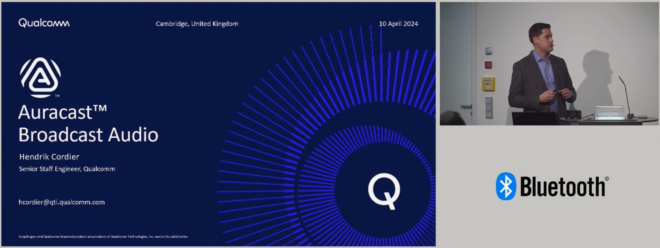

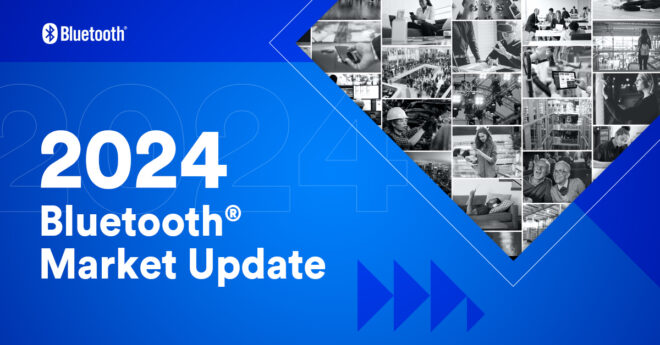

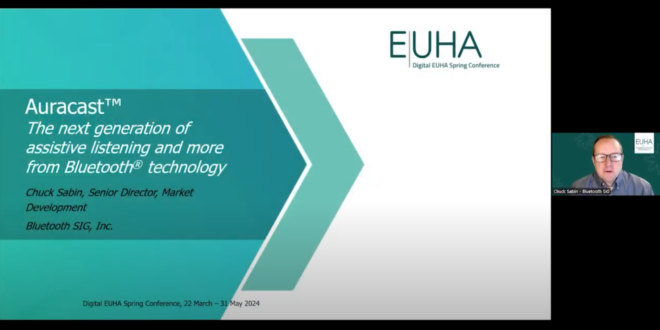
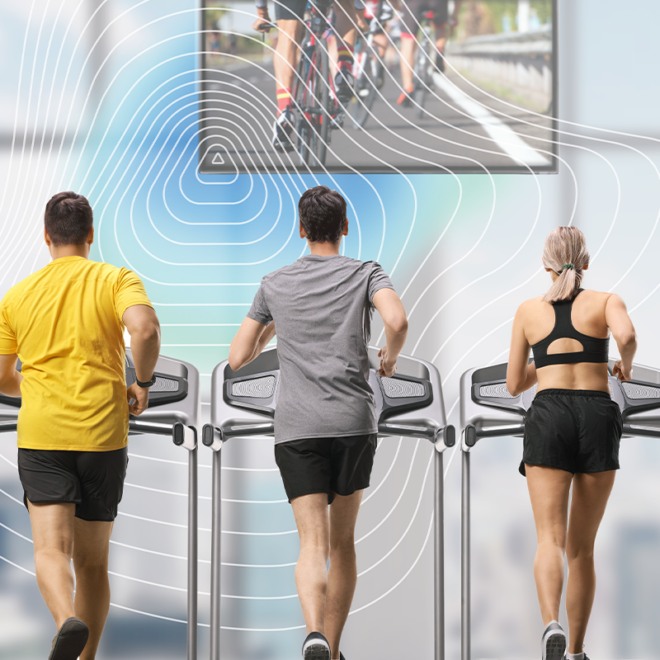
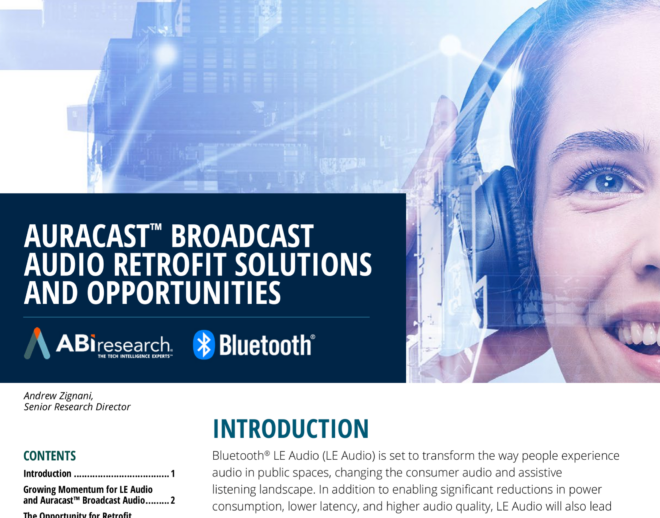
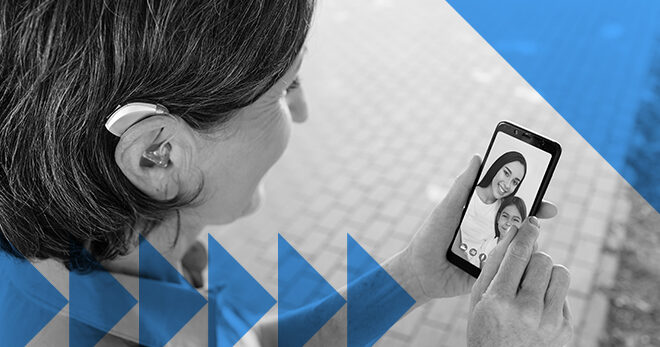
![packetcraft logo tagline[1]](https://www.bluetooth.com/wp-content/uploads/2024/03/packetcraft_logo_tagline1.png)
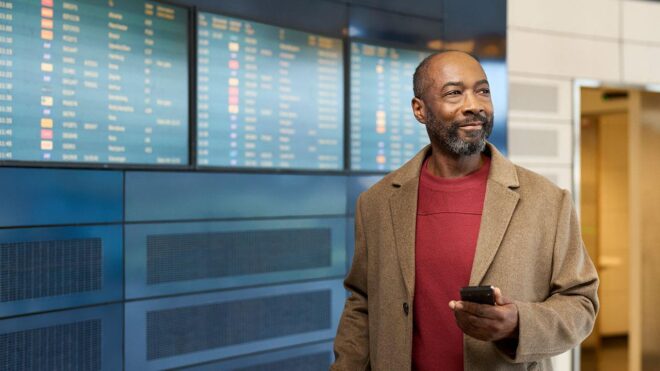
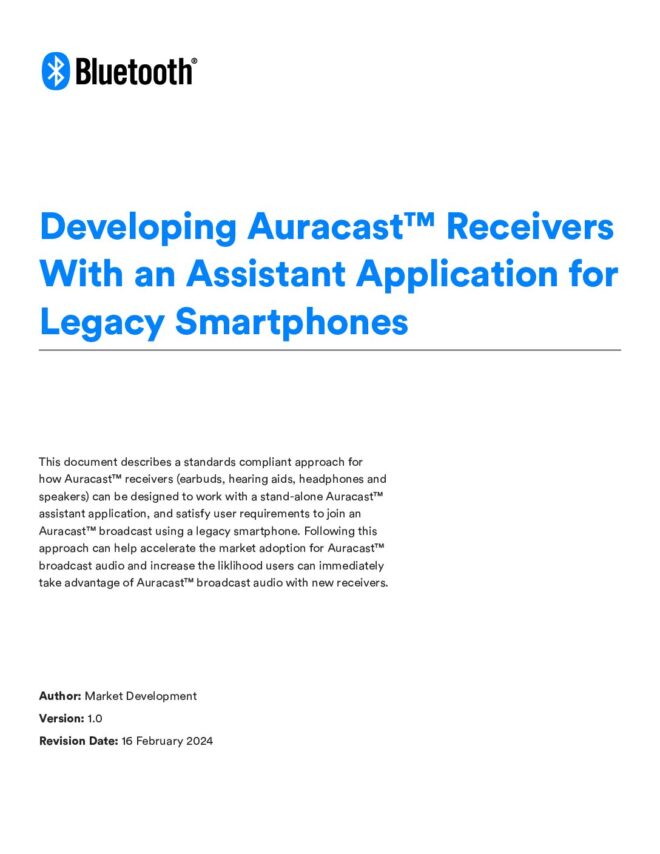
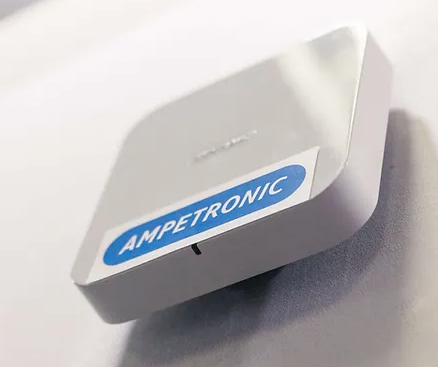
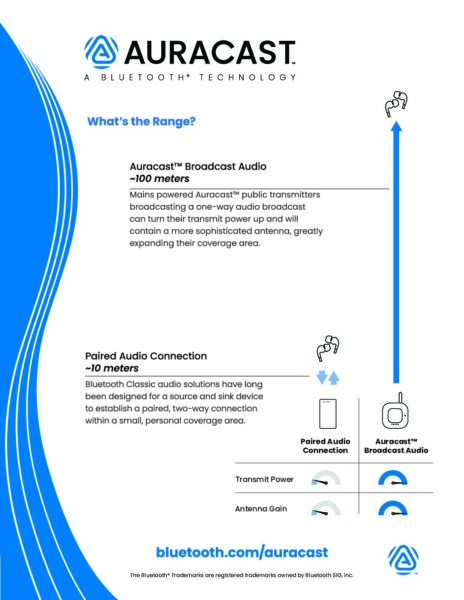
![2312 CES Handout Images FINAL existing pdf 464x600[1]](https://www.bluetooth.com/wp-content/uploads/2024/01/2312_CES_Handout-Images_FINAL-existing-pdf-464x6001-1.jpg)
![2312 CES Handout Images FINAL unlimited pdf 464x600[1]](https://www.bluetooth.com/wp-content/uploads/2024/01/2312_CES_Handout-Images_FINAL-unlimited-pdf-464x6001-1.jpg)
